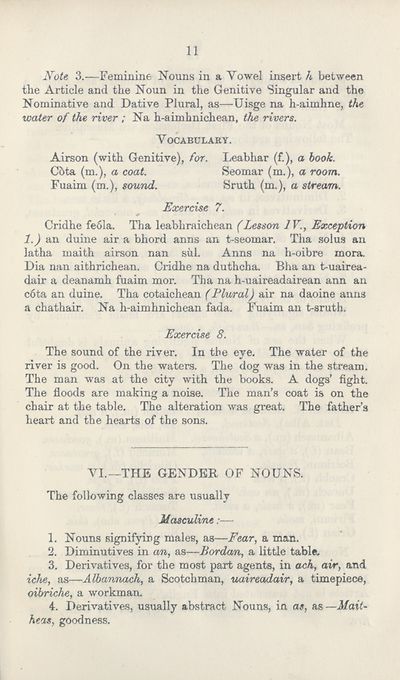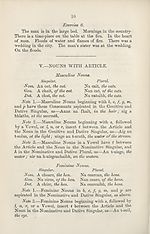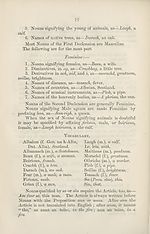Books and other items printed in Gaelic from 1871 to 1900 > Elementary lessons in Gaelic
(17) Page 11
Download files
Complete book:
Individual page:
Thumbnail gallery: Grid view | List view

11
Xote 3.—Feminine Nouns in a Vowel insert h between
the Article and the Noun in the Genitive Singular and the
Nominative and Dative Plural, as—Uisge na h-aimhne, the
water of the river ; Na h-aimhnichean, the rivers.
Vocabulary.
Airson (with Genitive), for. Leabhar (f.), a book.
Cota (m.), a coat. Seomar (m.), a room.
Fuaim (m.), sound. Bruth (m.), a stream.
Exercise 7.
Cridhe fe61a. Tha leabhraichean (Lesson IV., Exception
1.) an duine air a bhord anns an t-seomar. Tlia solus an
latha maith airson nan sill. Anns na h-oibre mora.
Dia nan aithrichean. Gridhe na duthcha. Bha an t-uairea-
dair a deanamh fuaim mor. Tha na h-uaireadairean ann an
cota an duine. Tha cotaichean (Plural) air na daoine anns
a chathair. Na h-aimhnichean fada. Fuaim an t-sruth.
Exercise 8.
The sound of the river. In the eye. The water of the
river is good. On the waters. The dog was in the stream.
The man was at the city with the books. A dogs' fight.
The floods are making a noise. The man's coat is on the
chair at the table. The alteration was great. The father's
heart and the hearts of the sons.
VI.—THE GENDER OF NOUNS.
The following classes are usually
Masculine:—
1. Nouns signifying males, as—Fear, a man.
2. Diminutives in an, as—Bordan, a little table.
3. Derivatives, for the most part agents, in ach, air, and
iclie, as—Albannach, a Scotchman, uaireadair, a timepiece,
oibriche, a workman.
4. Derivatives, usually abstract Nouns, in as, as—Maii-
heas, goodness.
Xote 3.—Feminine Nouns in a Vowel insert h between
the Article and the Noun in the Genitive Singular and the
Nominative and Dative Plural, as—Uisge na h-aimhne, the
water of the river ; Na h-aimhnichean, the rivers.
Vocabulary.
Airson (with Genitive), for. Leabhar (f.), a book.
Cota (m.), a coat. Seomar (m.), a room.
Fuaim (m.), sound. Bruth (m.), a stream.
Exercise 7.
Cridhe fe61a. Tha leabhraichean (Lesson IV., Exception
1.) an duine air a bhord anns an t-seomar. Tlia solus an
latha maith airson nan sill. Anns na h-oibre mora.
Dia nan aithrichean. Gridhe na duthcha. Bha an t-uairea-
dair a deanamh fuaim mor. Tha na h-uaireadairean ann an
cota an duine. Tha cotaichean (Plural) air na daoine anns
a chathair. Na h-aimhnichean fada. Fuaim an t-sruth.
Exercise 8.
The sound of the river. In the eye. The water of the
river is good. On the waters. The dog was in the stream.
The man was at the city with the books. A dogs' fight.
The floods are making a noise. The man's coat is on the
chair at the table. The alteration was great. The father's
heart and the hearts of the sons.
VI.—THE GENDER OF NOUNS.
The following classes are usually
Masculine:—
1. Nouns signifying males, as—Fear, a man.
2. Diminutives in an, as—Bordan, a little table.
3. Derivatives, for the most part agents, in ach, air, and
iclie, as—Albannach, a Scotchman, uaireadair, a timepiece,
oibriche, a workman.
4. Derivatives, usually abstract Nouns, in as, as—Maii-
heas, goodness.
Set display mode to:
![]() Universal Viewer |
Universal Viewer | ![]() Mirador |
Large image | Transcription
Mirador |
Large image | Transcription
Images and transcriptions on this page, including medium image downloads, may be used under the Creative Commons Attribution 4.0 International Licence unless otherwise stated. ![]()
| Rare items in Gaelic > Books and other items printed in Gaelic from 1871 to 1900 > Elementary lessons in Gaelic > (17) Page 11 |
|---|
| Permanent URL | https://digital.nls.uk/106251286 |
|---|
| Description | Out-of-copyright books printed in Gaelic between 1631 and 1900. Also some pamphlets and chapbooks. Includes poetry and songs, religious books such as catechisms and hymns, and different editions of the Bible and the Psalms. Also includes the second book ever published in Gaelic in 1631. |
|---|

